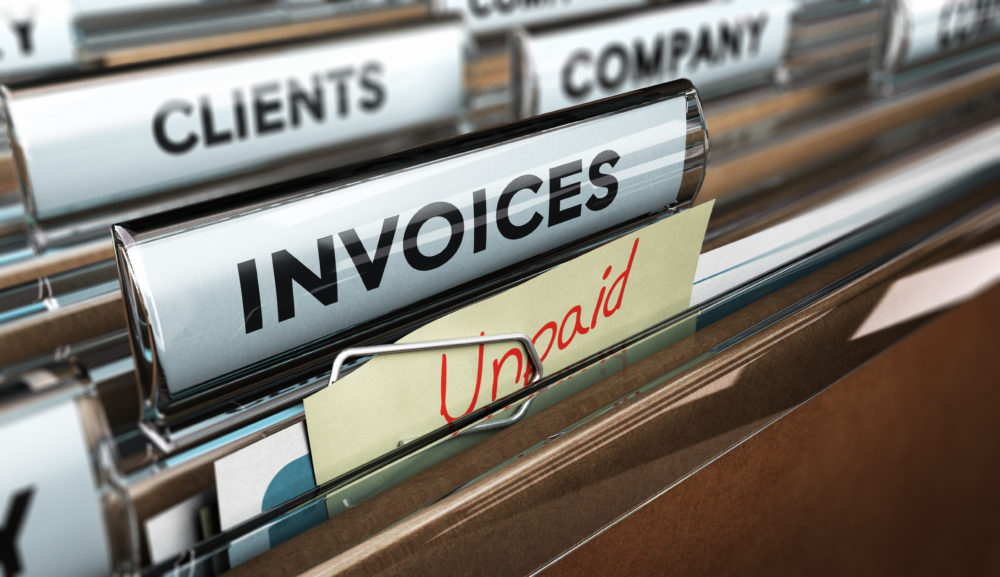New figures from Dun and Bradstreet show that more UK businesses are being paid on time.
The firm’s Q4 report suggests that the number of payments made within agreed terms is improving across all sectors. In the three months to December 2018, 36% of payments were made on time versus 31% in September.
This increase has emerged despite a general deterioration in macroeconomic conditions.
Though it’s great news for small businesses, research from Dun & Bradstreet in late 2018 found that at any one time, SMEs were owed an average of £80,000.
Options for chasing late payments
If you’re still suffering from late payments, changing the way you chase up companies up can make a substantial difference to your cash flow.
Take some tips from these entrepreneurs and business experts.
Go legal
Federica Monsone, owner of network storage provider A3 Communications, decided to contact a solicitor after a client had ignored three invoices she had sent them.
“My options seemed to be that I could either hire a debt collector, which I felt would cost too much money, or write the debt off,” she says.
For Monsone, neither of these options seemed cost-effective, particularly as writing the debt off would be no guarantee of future contracts with the client.
“It seemed to me that the company was struggling so I was doubtful whether we would even get any more business from them. And even if we did, this might have been the first of many non or late payments.”
After doing some research Monsone eventually found a solicitor who wrote her client a legal letter demanding payment. She says: “This only cost £100, but it made us look serious enough for them to consider that there may be legal ramifications if they didn’t pay. I recovered all the money minus the interest they owed.”
Don’t mess around
Carl Hackman, director of debt collection agency CCI Credit Management (formerly CCI Legal), says that there has been a growing demand on the part of small businesses for using their services. The company typically charges 10% of the total amount recovered.
He says: “Small companies often don’t want to upset their larger clients. So by using third-party intervention it’s diplomatic and tactful and in everyone’s interest.”
Hackman adds that the advantage for a small business with this approach is that it has a better chance of retaining its client, as the company is only paying what it owes. “No late charges are incurred and our fee is paid by the small business,” says Hackman.
Alternative options
Benjamin Smart, former regional manager of Business Link London, suggests there are other things you can do before taking legal action or calling in a third party. He says it is a good idea to visit the company first and find out if there are any discrepancies with the outstanding balance.
“This should be followed up with a phone call to set a date and standing order for when the money is due to be paid by the client,” says Smart. “If it is a large amount of money, say around £100,000, this is the point where you can get the bank to bring in invoice financing. If the company doesn’t follow through with the payment the bank pays 90% of the money upfront to you, and then chases the debtor with legal action.”
Kick up a fuss
In a landmark victory for small businesses, Justine Thompson, owner of training company MTa Learning (was MTa International), took on pharmaceutical giant, Boots, for extending its payment policy to 75 days and charging a 2.5 % processing fee.
She says: “As soon as we started to get the media involved and I had agreed to speak on the radio, they backed down and changed their terms back to 30 days with no 2.5% fee.”
But Thompson is sceptical about the options currently available to SMEs. She says: “I don’t see debt collection as being any better at gaining leverage than legal options; when SMEs start to kick and fuss they are in danger of losing their clients. I was fortunate because I wasn’t in a position where I was reliant on the Boots contracts.”
For Thompson, small businesses need to join together to fight larger organisations. “It’s not just a business issue but a moral and ethical one too and it’s not something they can fight on their own.”
See also: How to deal with late payment





